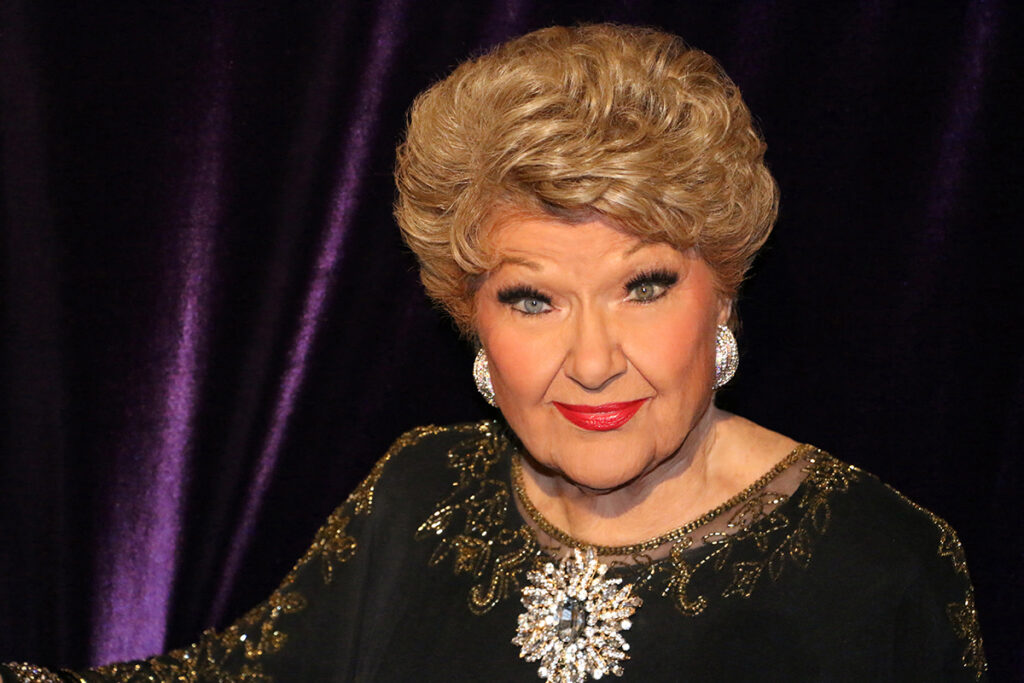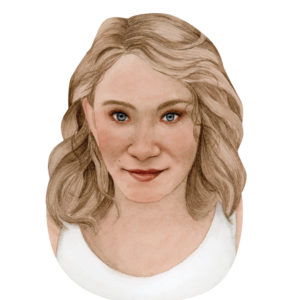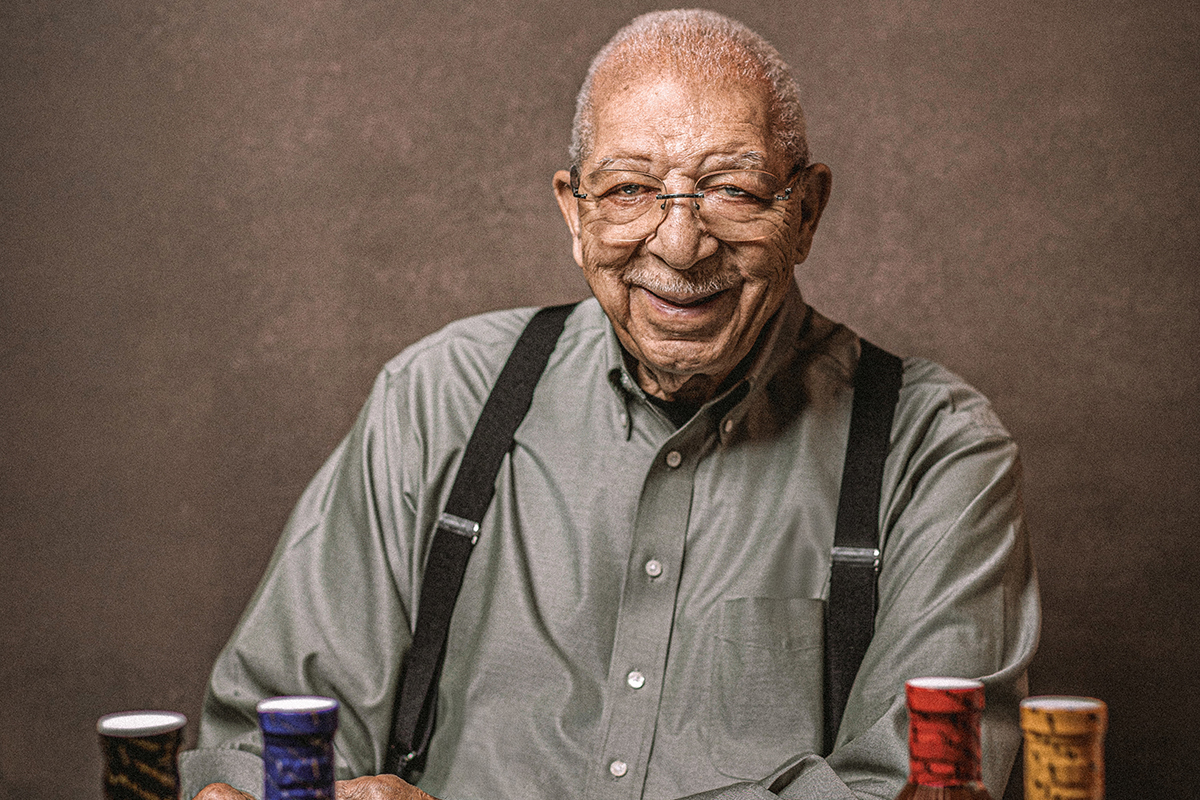Julie Turner distinctly recalls the first time she saw vocalist Marilyn Maye perform. It was sometime in the late fifties, at the swank Colony Steakhouse in downtown KC’s Ambassador Hotel. A friend told Turner—a newcomer to the local music scene who had dreams of becoming a singer—that she had to check out Maye.
So on one weeknight, Turner strolled into the dim bar. Maye dazzled the audience with her charisma and crystal clear tone—and the blazing red hair and blue sequins Turner so vividly remembers. “I knew she was going to be good, but I was overwhelmed and awed,” Turner says. “It was just unbelievable.”
Maye is still unbelievable. Now ninety-four years old, she’s one of the last and best of her era. Maye was born in Wichita and raised in Topeka and Des Moines, but she called Kansas City home for nearly seventy years, and it’s where her rise to fame began.
Hailed by her friend Ella Fitzgerald as “the greatest white female singer in the world,” Maye’s career is beyond storied, spanning over eight decades and seven full-orchestra RCA records. She performed on the The Tonight Show Starring Johnny Carson seventy-six times, a record for any singer. That’s just one of many credits.
In April, she’ll turn ninety-five. As part of her upcoming birthday celebration, she’ll be performing at Carnegie Hall alongside The New York Pops on March 24. “Heaven knows I practiced enough,” Maye quips. Maye will officially ring in her birthday in April at notable Midtown Manhattan cabaret club 54 Below as part of a ten-day residency that has become a birthday tradition.
Eighty-six years after her career began, Maye has never stopped or even slowed down. Show biz is who she is.
Growing up in Kansas amid the Dust Bowl, Maye began entering amateur talent contests at just three years old, and her career was set into motion upon winning one of the competitions. The prize? A thirteen-week radio program on WIBW in Topeka. By the time she was attending East High School in Des Moines, Maye had her own, permanent radio spot for her show, Marilyn Entertains, on KRNT at age fifteen. “I had to skip Spanish class to walk down and catch the streetcar in Des Moines to get to the station,” Maye says. “So I’m not very good at Spanish.”
From there, she spent her early twenties honing her chops as a staff vocalist in Louisville, Kentucky, singing alongside both combos and full orchestras. But then a new opportunity arose.
In the mid-fifties, Maye moved to KC, taking on a gig five nights a week at one of the city’s first upscale steakhouses, the Colony Steakhouse on Broadway, alongside her accompanist, musical director and then-husband, pianist Sammy Tucker. Throughout her eleven-year residency, Maye transformed the hotel restaurant and bar into a venue with world-class entertainment that often only had standing room available.
It was at the Colony where she was discovered by the fifties and sixties late-night talk show host Steve Allen (a contemporary and rival of Ed Sullivan), which led to a plethora of other opportunities, including an RCA contract, a Grammy nomination and frequent features on multiple variety shows. She became a mainstay of Kansas City’s scene and a mentor to many young, up-and-coming musicians.
Turner got her first big break as a singer with the help of Maye. Maye even introduced Turner to her husband, drummer Tommy Ruskin. Soon after Maye and Turner met at the Colony, a friendship and mentorship sparked. Turner began taking lessons from Maye, occasionally sitting in at the Colony as well. “But the real lessons were going into the Colony and watching her perform,” Turner says.
One day, when Turner went over to Maye’s house for a lesson, Maye called up Warren Durrett, the leader of a KC-based dance band that played locally and toured often. He had been looking for a singer for a while. “We think we have the girl,” Maye told Durrett.
Soon after, Maye and Tucker made an appointment with Durrett for Turner to audition—Maye even drove her to the audition. Turner got the call back shortly after, and the rest is history.
“She always gave me the push and confidence I needed,” Turner says.
Today, Maye continues her work as an avid educator and mentor and maintains an exceptionally busy schedule at any age in New York City. “The teaching has been really inspirational to me,” Maye says.
Maye hosts in-person masterclasses and also does more personal coachings, working with students of all ages, from amateurs to aspiring Broadway stars, all with a passion to sing. Her masterclass slots often fill up quickly, with just as many signing up to audit so they can see Maye’s coaching in action. “Some people play bridge, some people play golf, but some people love to sing,” Maye says.
While Maye’s career never had a true lull, she saw a resurgence in her popularity at age seventy-eight, particularly in New York. Her die-hard fans, who range from musical theater fanatics to jazz lovers, fly in from around the country to see her. A lot of them are singers themselves who come to learn just by listening.
“She’s become the queen of New York,” says Rod Fleeman, a longtime guitarist for Maye.
While much of her material is from the Great American Songbook, Maye walks a fine stylistic line that few others can. “She’s a rare blend of two worlds that don’t usually coexist,” Fleeman explains. Maye effortlessly owns powerful, rubato passages in a classic cabaret style just as well as she does jazz standards: “She can swing her ass off,” Fleeman says.
But the “super singer,” as she was frequently dubbed by Johnny Carson in front of millions on national broadcast, has more tricks up her sleeve. She released a soul album in 2005, Maye Sings Ray, a tribute to Ray Charles, and she writes witty parodies and medleys for both herself and students.
Maye does more than sing: She is a classic entertainer, and she has a particular approach when it comes to charming her audiences.
“I sing to the people, not for them,” Maye explains. Whether at the Colony or Carnegie, Maye commands the attention of each and every concertgoer through personal connection—particularly eye contact. “To me, the lyric is conversation,” Maye says. “We don’t talk to each other with our eyes closed. It’s a story that I have to convey, and I have to look everyone in the audience in the eye.”
“I’m amazed at every attention to detail, whether it’s the movement of her hands or the way she understands connecting to a crowd,” Fleeman says.
Although Maye is still KC-based, she rarely performs locally. But if you’re down for a Midwest road trip, Maye has some performances this year within driving distance. On April 21 and 22, immediately following her ten-day birthday celebration at 54 Below, Maye will perform at Feinstein’s at Hotel Carmichael in the Indianapolis suburb of Carmel. On August 2 and 3, she’ll perform two shows in Lake Okoboji, Iowa, at the Pearson Lakes Art Center, where she’s performed every summer since 1956 with the exception of 2020.
“I just keep moving,” Maye says.
Marilyn Maye’s Keys to Longevity

At any age, Maye’s energy, stamina and vocal control is unmatched. And retirement is not a word in her vocabulary.
I called Maye on her way back to her New York apartment from a private performance in Vermont. In the background, I could hear the jolting bumps of the rural road as Maye rode with the rest of her band in the back of a van.
According to Maye, the key to her great health and longevity—and the vibrant, youthful timbre of her voice—lies in endurance.
“I’ve never, ever stopped,” Maye says. “You have to keep moving. I take a lot of vitamins. I don’t take any drugs, and I never smoked. I think that’s one great, big thing in the fact that my voice is hanging in there.”
Maye is an inspiration to her friends, family, students and colleagues—really just about everyone she meets. “How many people are almost ninety-five, still on the road and knocking everyone out at every performance?” vocalist Julie Turner says. KC-based guitarist Rod Fleeman has witnessed Maye’s diligence and artistry since they began playing together in 1972. “Her work ethic is just beyond belief,” Fleeman says.
Although the singing may sound effortless, the work isn’t. “It takes great energy,” Maye says. “I love what I do, but I have to say, it’s not easy.”






